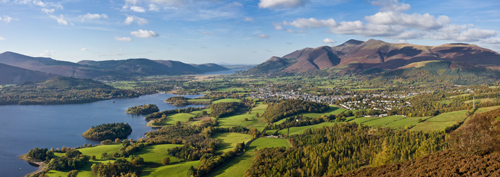To Wordsworth
Aubrey Thomas de Vere
on visiting the Duddon.
I
So long as Duddon, 'twixt his cloud-girt walls
Thridding the woody chambers of the hills.
Warbles from vaulted grot and pebbled halls
Welcome or farewell to the meadow rills;
So long as linnets chant low madrigals
Near that brown nook the labourer whistling tills,
Or the late-reddening apple forms and falls
Mid dewy brakes the autumnal redbreast thrills,
So long, last poet of the great old race,
Shall thy broad song through England's bosom roll,
A river singing anthems in its place,
And be to later England as a soul.
Glory to Him who made thee, and increase
To them that hear thy word, of love and peace!
II
When first that precinct sacrosanct I trod
Autumn was there, but Autumn just begun;
Fronting the portals of a sinking sun,
The queen of quietude in vapour stood,
Her sceptre o'er the dimly crimsoned wood
Resting in light. The year's great work was done;
Summer had vanished, and repinings none
Troubled the pulse of thoughtful gratitude.
Wordsworth! the autumn of our English song
Art thou; 'twas thine our vesper psalms to sing:
Chaucer sang matins; sweet his note and strong,
His singing-robe the green, white garb of Spring:
Thou like the dying year art rightly stoled,—
Pontific purple and dark harvest gold.
The River Duddon, which runs down Dunnerdale, was one of Wordsworth's favourite rivers and inspired much poetry from him.
Wordsworth was a great admirer of De Vere's work, especially his sonnets.
Main Location:
River Duddon, Lake District, Cumbria, England

Photo by DAVID ILIFF. License: CC-BY-SA 3.0